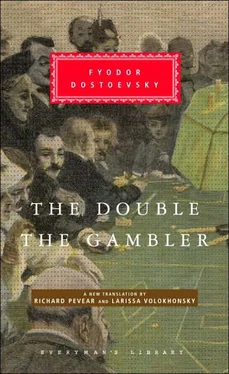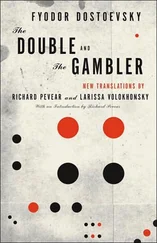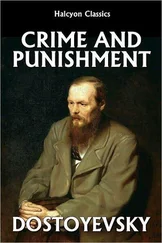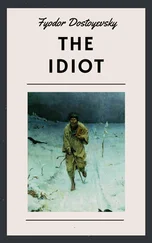Fyodor Dostoevsky - The Double
Здесь есть возможность читать онлайн «Fyodor Dostoevsky - The Double» весь текст электронной книги совершенно бесплатно (целиком полную версию без сокращений). В некоторых случаях можно слушать аудио, скачать через торрент в формате fb2 и присутствует краткое содержание. Жанр: Классическая проза, на английском языке. Описание произведения, (предисловие) а так же отзывы посетителей доступны на портале библиотеки ЛибКат.
- Название:The Double
- Автор:
- Жанр:
- Год:неизвестен
- ISBN:нет данных
- Рейтинг книги:4 / 5. Голосов: 1
-
Избранное:Добавить в избранное
- Отзывы:
-
Ваша оценка:
- 80
- 1
- 2
- 3
- 4
- 5
The Double: краткое содержание, описание и аннотация
Предлагаем к чтению аннотацию, описание, краткое содержание или предисловие (зависит от того, что написал сам автор книги «The Double»). Если вы не нашли необходимую информацию о книге — напишите в комментариях, мы постараемся отыскать её.
Poor Folk.
The Double
The Double — читать онлайн бесплатно полную книгу (весь текст) целиком
Ниже представлен текст книги, разбитый по страницам. Система сохранения места последней прочитанной страницы, позволяет с удобством читать онлайн бесплатно книгу «The Double», без необходимости каждый раз заново искать на чём Вы остановились. Поставьте закладку, и сможете в любой момент перейти на страницу, на которой закончили чтение.
Интервал:
Закладка:
Finally, to complete the picture, Petrushka, following his favorite habit of always going about casually, in home-style, was barefoot now as well. Mr. Goliadkin inspected Petrushka all around and apparently remained pleased. The livery had obviously been rented for some solemn occasion. It was also noticeable that during the inspection Petrushka looked at his master with some strange expectation, and followed his every movement with extraordinary curiosity, which greatly embarrassed Mr. Goliadkin.
“Well, and the carriage?”
“The carriage has come, too.”
“For the whole day?”
“For the whole day. Twenty-five, in banknotes.” {2} 2 Silver roubles and paper roubles (banknotes) circulated simultaneously in Russia at that time, the silver rouble being worth more than the paper.
“And they’ve brought the boots?”
“And they’ve brought the boots.”
“Blockhead! Can’t you say they’ve brought them, sir ? Bring them here.”
Having expressed his satisfaction that the boots fit well, Mr. Goliadkin asked for tea, a wash and a shave. He shaved rather painstakingly and washed in the same way, hastily sipped some tea, and proceeded to his main, definitive dressing: he put on almost perfectly new trousers; then a shirt front with little bronze buttons, a waistcoat with rather bright and agreeable little flowers; tied a multicolored silk cravat around his neck, and finally pulled on a uniform jacket, also spanking new and painstakingly brushed. While dressing, he glanced lovingly at his boots several times, lifted now one foot, now the other, admired the style, and kept whispering something under his nose, occasionally winking at his thoughts with an expressive little grimace. However, Mr. Goliadkin was extremely distracted that morning, because he let Petrushka’s little smiles and grimaces on his account as he helped him dress go almost unnoticed. Finally, having adjusted everything properly, the fully dressed Mr. Goliadkin put his wallet in his pocket, definitively admired Petrushka, who had put on his boots and was thus in full readiness, and, noticing that everything had been done and there was nothing more to wait for, hastily, bustlingly, with little trepidations of the heart, ran down his stairs. A light blue hackney carriage with some coat-of-arms on it rolled up thunderingly to the porch. Petrushka, exchanging winks with the coachman and various idlers, seated his master in the carriage; in an unaccustomed voice and barely holding back his foolish laughter, he shouted: “Gee-up!” and jumped onto the tailboard, and the whole thing, with noise and thunder, jingling and clattering, rolled off towards Nevsky Prospect. {3} 3 Nevsky Prospect is the central thoroughfare of Petersburg; its mysterious qualities are celebrated in a story of the same name by Gogol.
The blue carriage had no sooner driven through the gate than Mr. Goliadkin rubbed his hands convulsively and dissolved into quiet, inaudible laughter, like a man of merry character who has managed to play a nice trick and is as glad of it as glad can be. However, immediately following this fit of merriment, the laughter on Mr. Goliadkin’s face changed to a strangely preoccupied expression. Though the weather was damp and gray, he lowered both windows of the carriage and began looking concernedly to right and left at passersby, immediately assuming a decent and decorous air as soon as he noticed someone looking at him. At the turn from Liteinaya onto Nevsky, he gave a start from a most unpleasant sensation and, wincing like some poor fellow whose corn has accidentally been stepped on, hastily and even fearfully pressed himself into the darkest corner of the carriage. The thing was that he had met two of his colleagues, two young clerks from the department where he himself worked. The clerks, as it seemed to Mr. Goliadkin, were for their own part also extremely perplexed at meeting their colleague in this fashion; one of them even pointed his finger at Mr. Goliadkin. It even seemed to Mr. Goliadkin that the other called him loudly by name, which, naturally, was quite an improper thing to do in the street. Our hero stayed hidden and did not respond. “Little brats!” he began to reason with himself. “Well, what’s so strange? A man in a carriage; a man needs to be in a carriage, so he takes a carriage. Simply trash! I know them—they’re simply brats who ought to be whipped! They only play pitch-and-toss on payday and mooch about somewhere, that’s what they do. I could tell them all a thing or two, only…” Mr. Goliadkin did not finish and went dead. A brisk pair of pretty Kazan horses, quite familiar to Mr. Goliadkin, hitched to a jaunty droshky, was quickly passing his carriage on the right. The gentleman sitting in the droshky, chancing to see the face of Mr. Goliadkin, who quite imprudently stuck his head out the window of the carriage, was apparently also extremely amazed at such an unexpected encounter and, leaning out as far as he could, began peering with great curiosity and concern into the corner of the carriage, where our hero had hastened to hide. The gentleman in the droshky was Andrei Filippovich, head of an office in the place where Mr. Goliadkin also served in the quality of assistant to his section chief. Mr. Goliadkin, seeing that Andrei Filippovich recognized him perfectly well, was looking at him all eyes, and it was simply impossible to hide from him, blushed to the roots of his hair. “Should I bow or not? Should I respond or not? Should I acknowledge him or not?” our hero thought in indescribable anguish. “Or pretend it’s not me but someone else strikingly resembling me, and look as if nothing has happened? Precisely not me, not me, and that’s that!” Mr. Goliadkin said, tipping his hat to Andrei Filippovich and not taking his eyes off him. “I…I’m all right,” he whispered with effort, “I’m quite all right, it’s not me at all, Andrei Filippovich, it’s not me at all, not me, and that’s that.” Soon, however, the droshky passed the carriage, and the magnetism of the directorial gaze ceased. However, he still kept blushing, smiling, muttering something to himself…“I was a fool not to respond,” he thought finally, “I should simply have taken a bold footing and said frankly, but not without nobility, ‘Thus and so, Andrei Filippovich, I’m also invited to dinner, and that’s that!’ ” Then, suddenly remembering that he had flunked it, our hero flared up like fire, frowned, and cast a terrible, defiant glance into the front corner of the carriage, a glance intended to incinerate all his enemies to dust at a stroke. Finally, by some sudden inspiration, he pulled the cord tied to the coachman’s elbow, stopped the carriage, and told the coachman to turn back to Liteinaya. The thing was that Mr. Goliadkin felt an immediate need, probably for the sake of his own peace of mind, to say something most interesting to his doctor, Krestyan Ivanovich. And though his acquaintance with Krestyan Ivanovich was quite recent—namely, he had visited him only once the previous week, owing to a certain necessity—a doctor, as they say, is the same as a father confessor, to hide would be stupid, and to know the patient was his duty. “Will all this be right, though?” our hero went on, stepping out of the carriage by the entrance to a five-story house on Liteinaya where he had ordered his equipage to stop, “will it all be right? Will it be decent? Will it be appropriate? So what, though,” he went on, going up the stairs, trying to catch his breath and restrain the throbbing of his heart, which was in the habit of throbbing on other people’s stairs, “so what? It’s my own affair, and there’s nothing reprehensible in it…It would be stupid to hide. So I’ll make believe that I’m all right, and that I was just passing by…He’ll see that it must be so.”
Интервал:
Закладка:
Похожие книги на «The Double»
Представляем Вашему вниманию похожие книги на «The Double» списком для выбора. Мы отобрали схожую по названию и смыслу литературу в надежде предоставить читателям больше вариантов отыскать новые, интересные, ещё непрочитанные произведения.
Обсуждение, отзывы о книге «The Double» и просто собственные мнения читателей. Оставьте ваши комментарии, напишите, что Вы думаете о произведении, его смысле или главных героях. Укажите что конкретно понравилось, а что нет, и почему Вы так считаете.












